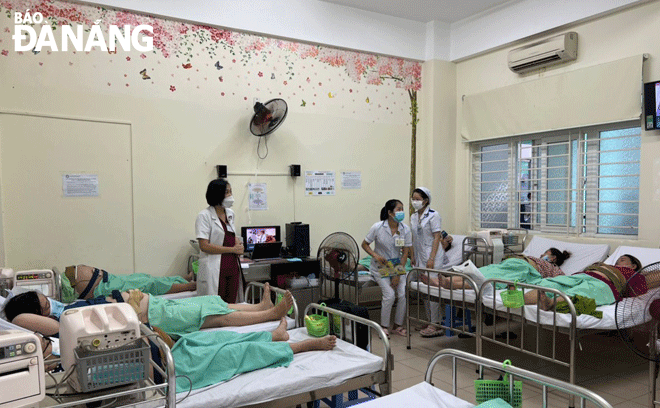Screening needed to reduce birth defects
Newborn babies are at risk of diseases, including genetic factors. Postnatal screening is essential for early detection of dangerous malformations, thereby taking appropriate interventions.
 |
| Medical staff of the Da Nang Maternity and Paediatrics Hospital provide consultations related to postnatal screening for pregnant women. Photo: PHAN CHUNG |
Each year, the Newborn Screening Center of the Da Nang Maternity and Paediatrics Hospital performs postnatal screening for more than 16,000 newborns. Based on the prenatal and postnatal diagnosis procedures issued by the Ministry of Health, the center's medical staff perform a comprehensive examination and give medical consultations to families.
After birth, children will be screened for congenital heart disease and other diseases through heel blood collection and screening for hearing loss. Some diseases are often detected and treated promptly, such as G6DP deficiency, growth retardation, congenital hypothyroidism, metabolic disorders, hearing loss, and congenital heart disease.
According to Dr. Nguyen Thi Thu Phuong, Director of the Newborn Screening Center, newborn screening after birth is very important and necessary to detect, treat, and intervene in time with diseases in children. After screening, many newborns are found to have some genetic diseases, lack of development hormones, and have metabolic disorders.
“In just one month, through postnatal screening for more than 1,000 newborns, we have recorded 12 cases of G6DP deficiency causing kidney failure, even cerebral palsy and growth retardation; 7 cases of hypothyroidism; 11 cases of hearing loss, and 26 cases of congenital heart defects” Dr. Phuong revealed.
Depending on detected diseases, the center will transfer to the appropriate departments for treatment, consultation and monitoring. The severity is different, but early and timely detection will increase the ability and effectiveness of treatment, Mrs. Phuong added.
In the past, medical examination, testing and screening activities took place slowly because medical staff had to send samples to medical facilities in Ha Noi and Ho Chi Minh City.
However, in recent years, newborn screening activities in Da Nang have been promoted, and the Newborn Screening Center of the Da Nang Maternity and Paediatrics Hospital has mastered testing and screening techniques. This helps to shorten the time for diagnosis, screening and disease detection among a majority of newborns, thereby providing timely treatment and advice.
Accordingly, within 72 hours after birth, babies will be examined, fully tested and screened. After taking medical history of mothers and newborns, medical staff will provide physical examinations, assess the development status and perform ultrasounds and tests.
“This is a proactive professional activity aimed at improving the quality of the population in the future. If a child is born with an unfortunate illness that is not detected and does not receive timely treatment will be very disadvantageous and become a burden to the family and society. Therefore, parents need to learn about, care and be proactive in registering for examination and screening for their children after birth” Dr. Phuong said.
Reporting by PHAN CHUNG - Translating by M.DUNG